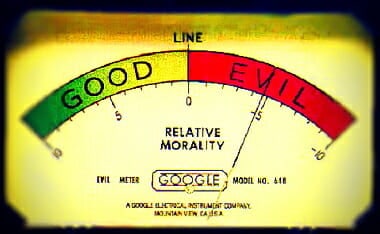Just to temper the first point of the three via the above video, I wanted to add these explanations of Biblical patriarchy and the male/female relationship by Nora Hale:
- God does not have a gender. He is neither male nor female. Gender is a biological characteristic, and God is not a biological being. God is Spirit (John 4:24), and spirit does not have flesh and blood (Luke 24:39). However, in the Bible God is always referred to in the masculine. This is most probably because of how God “the Father” relates to Jesus, who is the Son of God. He was born a male, and in the Biblical culture the male is the one who represents his descendants (1 Cor. 15:22) and has the authority in the family (Gen. 27:1-29, 48:13-14). When Adam and Eve were in the Garden of Eden, Eve sinned first, but sin entered the world through Adam (Romans 5:12). This means it was the man Adam who possessed representative authority, not Eve. This phenomena is called Federal Headship…. (CARM)
Christianity Today explains well the main idea with this topic. While they have an excellent article as a whole, this doctrine of offices withing the Trinity and how we should revere these distinctions in the Godhead are what made the Jewish survival possible. Most ancient Near-East views of creation and of their sustenance were through fertility goddesses:
Not an Invention
Feminine images are used throughout Scripture to describe God’s compassionate and loving nature. Examples include the frequent images of God protecting and comforting his children (Isa. 66:12–13; Hos. 11:1–4). But it’s important to note that God is never addressed as Mother. This phenomenon is unique compared with the cultures surrounding the original biblical writers. Most ancient Near Eastern societies had a goddess as the main cult figure or at least to complement a male god—Asherah in Canaan, Isis in Egypt, Tiamat in Babylon. If patriarchy is responsible for cultures portraying God as male, then we would expect goddess worship to reflect a matriarchal society—one in which women are given superior status or at least are equal to men. But this is not the case. Even today, many societies devoted to goddess worship remain oppressive toward women. Devotion to the goddess Kali in Hinduism, for instance, has never resulted in better treatment of women, even among Kali devotees.
We could even say that Israel succumbed to an idea of God that was rather against her natural disposition. Left to themselves, the Israelites would have ended up worshiping the Baals and Asherahs—Canaanite fertility gods and goddesses. Israel’s prophets singled out idolatry for fierce denunciation because its people were constantly tempted to do just that. But Israel’s idea of God’s fatherhood bucked a common trend in the ancient world. Hence, it could not have been an Israelite invention, but rather the result of a long history of living under the revelation of God. It is the church’s continuity with this narrative of Israel that would lead eventually to the uniquely Christian doctrine of God as Father, Son, and Holy Spirit.
In the New Testament, God’s fatherhood conveys two distinct ideas. First, it refers primarily to the internal relationship within the Trinity. This is how the first article of the Apostles’ Creed puts it: “I believe in God, the Father Almighty, the Maker of heaven and earth, and in Jesus Christ, his only Son, our Lord.” Even as early as Paul’s writings, the phrase “God and Father of our Lord Jesus Christ” had become commonplace. God is first and foremost the Father of our Lord Jesus Christ. This is not an invention of later church leaders, but comes directly from Christ, who refers to God as “Father.” In doing so, Jesus reveals a unique relationship between the Father and Son that constitutes the beginning of the Trinitarian doctrine.
Jesus taught his disciples to call God “our heavenly Father.” Therefore, the loving relationship he has with the Father from eternity now extends to those adopted into God’s family (Rom. 8:15). The father-son relationship is the most intimate personal relationship, one marked by reciprocal love and respect, and it is God’s supremely personal and loving nature that the term father is meant to underscore.
To claim, as many feminist theologians do, that the very presence of masculine metaphors for God excludes women simply does not square with the way Scripture uses them. Masculine images of God do not always convey exclusively “masculine” qualities. For example, Isaiah 54:5–7 refers to God as the Husband who with “deep compassion” (a stereotypically “feminine” quality) called estranged Israel back to himself (see also Isa. 49:13). The term father, then, excludes not feminine qualities, but rather the idea of a distant and impersonal deity, which is precisely the picture of the supreme being still seen in many primal religions.
Second, the father metaphor points to God as the Creator (e.g., Isa. 64:8; Mal. 2:10) “from whom every family in heaven and on earth derives its name” (Eph. 3:15). Father captures in one word two seemingly contrasting characteristics: God’s love for his creatures and his lordship over all creation. Here again, we see the difference between Israel and ancient Near Eastern cultures. In the Judeo-Christian faith, God the Father created the world as something separate from himself, whereas in Near Eastern societies, the mother metaphor pictures the mother-goddess giving birth to the world (which makes it an extension of the deity’s body). Calling God Mother undermines the Christian doctrine of creation by implying that God and the world are made of the same stuff and virtually indistinguishable. So, we need Father in order to get to the right doctrine of creation….
Apologetic Press (AP) goes on to quote CS Lewis’ excellent understanding of the larger idea at stake here. AP then quotes Peter Kreeft and Ronald Tacelli book…. which I will include the entire section of after this quote:
But must we refer to God via masculine terms? The question has nothing to do with what we would like to do, but rather with what God tells us to do. C.S. Lewis addressed this point in his book, God in the Dock:
Goddesses have, of course, been worshipped: many religions have had priestesses. But they are religions quite different in character from Christianity…. Since God is in fact not a biological being and has no sex, what can it matter whether we say He orShe, Father or Mother, Son or Daughter?
Christians think that God Himself has taught us how to speak of Him. To say that it does not matter is to say either that all the masculine imagery is not inspired, is merely human in origin, or else that, though inspired, it is quite arbitrary and unessential. And this is surely intolerable (1970, p. 237, emp. in orig.).
Scripture makes it clear: “O Jehovah, thou art our Father; we are the clay, and thou our potter; and we all are the work of thy hand…. Shall the potter be esteemed as clay; that the thing made should say of him that made it, ‘He made me not’; or the thing formed say of him that formed it, ‘He hath no understanding’?” (Isaiah 64:8; 29:16). Since when does the clay have the right to dictate to the potter or override his decisions? As a believer in God and His inspired Word, and yet as one speaking from an inherently masculine viewpoint, Lewis went on to say:
We have no authority to take the living and semitive figures which God has painted on the canvas of our nature and shift them about as if they were mere geometrical figures…. It is painful, being a man, to have to assert the privilege which Christianity lays upon my own sex. I am crushingly aware how inadequate most of us are, in our actual and historical individualities, to fill the place prepared for us. But it is an old saying in the army that you salute the uniform not the wearer…. A given man may make a very bad husband; you cannot mend matters by trying to reverse the roles… (1970, pp. 237-238, emp. added).
It is not man’s (or woman’s!) place to question God’s sovereign authority or divine will; neither falls under mankind’s jurisdiction.
Here is the fuller quote via Kreeft & Tacelli:
Is God a “He”?
The hottest controversy today about God concerns the traditional exclusive use of the pronoun he. Nearly all Christians admit that (1) God is not literally male, since he has no biological body, and (2) women are not essentially inferior to men. Those are red herrings.
There are, however, two reasons for defending the exclusive use of masculine pronouns and imagery for God. One issue is whether we have the authority to change the names of God used by Christ, the Bible and the church. The traditional defense of masculine imagery for God rests on the premise that the Bible is divine revelation, not culturally relative, negotiable and changeable. As C. S. Lewis put it, “Christians believe God himself has told us how to speak of him.”
The other reason for calling God “he” is historical. Except for Judaism, all other known ancient religions had goddesses as well as gods. The Jewish revelation was distinctive in its exclusively masculine pronoun because it was distinctive in its theology of the divine transcendence. That seems to be the main point of the masculine imagery. As a man comes into a woman from without to make her pregnant, so God creates the universe from without rather than birthing it from within and impregnates our souls with grace or supernatural life from without. As a woman cannot impregnate herself, so the universe cannot create itself, nor can the soul redeem itself.
Surely there is an inherent connection between these two radically distinctive features of the three biblical or Abramic religions (Judaism, Christianity and Islam): their unique view of a transcendent God creating nature out of nothing and their refusal to call God “she” despite the fact that Scripture ascribes to him feminine attributes like compassionate nursing (Is 49:15), motherly comfort (Is 66:13) and carrying an infant (Is 46:3). The masculine pronoun safeguards (1) the transcendence of God against the illusion that nature is born from God as a mother rather than created and (2) the grace of God against the illusion that we can somehow save our-selves—two illusions ubiquitous and inevitable in the history of religion.
Peter Kreeft and Ronald K. Tacelli, Handbook of Christian Apologetics (Downers Grove, IL: IVP Academic, 1994), 97-98.
Below will be a couple theological expansions of this thinking on a level of the seminarian. Enjoy the input as I have:
- Michael F. Bird, Evangelical Theology (Grand Rapids, MI: Zondervan, 2013), 137-138.
2.3.2 DOES GOD HAVE A GENDER?
Does the fact that God is depicted as male in the Scriptures create an androcentric conception of God that is oppressive to women? Is God really male in his essence? Are men more in the image of God than women because they are male? Does describing God as male provide religious sanction to patriarchal oppression and cultural imperialism? These are the questions about God and gender raised by feminist theologians. A few thoughts to consider here.
We can readily admit the sociolinguistic link between language and power. We can also recognize the injustices and inequalities in society perpetuated by gender discrimination. Yet retaining the maleness of God language as given in Scripture is not an automatic validation of an oppressive and abusive patriarchalism. The God who reveals himself as Father is the loving Father of all men and women. Those who receive Jesus Christ as Savior become “sons of God” (Rom 8:14, 19; Gal 3:26; 4:6 NIV [1984]) but also more generally “children of God” (John 1:12; Rom 8:16-17, 21; Phil 2:15; 1 John 3:10; 5:2). God will always remain a “he,” since God is a personal being, and the substitution of the noun “God” for the personal pronoun inevitably makes him impersonal in his speech and actions. The fact that God is described as “he” does not mean that God is intrinsically male, but he relates to us primarily in the masculine mode, as Father, Son, and Lord.”
It is notable that it is maleness and femaleness that constitutes the image of God according to Genesis 1:26-27. It is humanity created as male and female that marks the image and likeness of God. That means that God’s being cannot be confined to masculine qualities. Our humanity has a divine character expressed in the union of male and female. God is the sum of both genders because humanity as male and female are equally rooted in God’s divine being.
What is more, God is also described with maternal language and feminine imagery at several points in Scripture. Moses indicts the Hebrews for their rebellion in the wilderness: “You deserted the Rock, who fathered you; you forgot the God who gave you birth” (Deut 32:18). God is depicted like a nurse or mother in his care for his people (Ps 131:2). The love of God is compared to the love of a mother for her child (Isa 49:15; 66:13). God’s wisdom is considered one of the primary personifications of his work in the world (e.g., Prov 8:1-12; Jer 10:12; 51:15), and it is expressed in words that are grammatically feminine in both Hebrew (hokmâ) and Greek (sophia). Jesus could even depict himself like a mother hen protecting her chicks from a barnyard fire (Matt 23:37).
In the biblical witness, God’s fatherhood is not an oppressive or authoritarian persona that he adopts to force his will on others. Instead, we are to see the imagery of a father’s deep love for his children. Jesus taught his disciples to pray to the Father with the intimate term of abba (Matt 6:9; Mark 14:36; Rom 8:15; Gal 4:6). Jesus declared that God’s fatherhood is why he is so eager to answer prayer (Matt 7:9-11), for God’s love is like a father’s love for his children. And this is why the image of being “children of God” is so powerful. The God from whom we were formerly estranged on account of our sin has adopted us into his own family (John 1:12-13; Rom 8:13-17; Gal 3:26). If there is something good about a human father’s love for his children, then there is something infinitely good about the heavenly Father’s love for his children too.
I think it worth pointing out as well that all theological language is analogical since the finiteness of human language cannot contain the entirety of God in all his infinite being. Human language for God brings us only partial and incomplete analogies, parables, similes, and images of what God is like. All God language, including that freighted with connotations of human gender, male or female, and sonship, is only analogous to God’s being and not an absolute description of his person. Shirley Guthrie writes:
With respect to the doctrine of the Trinity … when we speak about God as “Father,” when we speak about the eternal “Son” who comes to us in the man Jesus (who taught us to call his Father “our Father”), and when he speaks about the “Spirit” who is the Spirit of the Father and of the Son, we are not talking about the gender of God (for God is neither male nor female). We are using analogical language from human experience to talk about the kind of relationship that exists between the members of the Trinity and between the triune God and us human beings—a relationship that is like the intimate relationship between parents and their children.
- William G. T. Shedd, edited by Alan W. Gomes, Dogmatic Theology, 3rd Edition (Phillipsburg, NJ: Presbyterian and Reformed Publishing, 2003), 253-257.
Deity of God the Father
The deity of God the Father is undisputed, and hence there is less need of presenting the proof of it. Divine names, attributes, works, and adorableness are ascribed to him.
The term father denotes an immanent and eternal relation of the first trinitarian person. God in himself and irrespective of any reference to the created universe is a father: the Father of the Son. Were God primarily the Father because of his relation to men and angels and not because of his relation to the second person in the Godhead, his fatherhood would begin in time and might consequently end in time. If there was once a time when God was not the Father of the Son, there may be a time when he will cease to be so. “It is the greatest impiety,” says Cyril of Jerusalem (Catecheses 11.8), “to say that after deliberation held in time God became a Father. For God was not at first without a Son and afterward in time became a Father.”
The hypostatic or trinitarian paternity of God the Father as related to the Son must not be confounded with the providential paternity of God the Trinity as related to the creation. Only one of the divine persons is the trinitarian Father; but the three persons in one essence constitute the providential and universal Father. The triune God is generally the Father of men and angels by creation and specially of the elect by redemption. Hence, the term father applied to God has two significations. It may denote divine essence in all three modes or in only one mode. The first clause in the Lord’s prayer is an example of the former. When men say, “Our Father who is in heaven,” they do not address the first person of the Godhead to the exclusion of the second and third. They address, not the untriune God of deism and natural religion, but the God of revelation, who is triune and as such the providential Father of all men and the redemptive Father of believers. If a man deliberately and consciously intends in his supplication to exclude from his worship the Son and the Holy Spirit, his petition is not acceptable: “He that honors not the Son honors not the Father” (John 5:23). A man may not have the three persons distinctly and formally in his mind when he utters this petition, and in this case he does not intentionally exclude any trinitar-ian person or persons; but the petition, nevertheless, ascends to the divine three, not to a single person exclusively; and the answer returns to him from the triune God, not from any solitary person exclusively. Says Witsius (Lord’s Prayer, diss. 7):
It is a doctrine firmly maintained by all orthodox divines, that the Father cannot be invoked in a proper manner, without at the same time invoking the Son and Holy Spirit, because they are one in nature and in honor. Nor can it, I think, be denied that, laying out of view the distinction of persons and looking only at what is common to all three persons in the Godhead, God may be denominated our Father. Yet I cheerfully concur with those interpreters who maintain that the Father of our Lord Jesus Christ is particularly addressed in the first petition.
Says Augustine (On the Trinity 5.2), “That which is written, ‘Hear, 0 Israel: the Lord our God is one Lord,’ ought not to be understood as if the Son were excepted or the Holy Spirit were excepted. This one Lord our God, we rightly call, also, our Father.” (See supplement 3.4.10.)
The term father denotes the Trinity in John 4:21, 23-24: “The hour comes when you shall neither in this mountain nor yet at Jerusalem worship the Father. The true worshipers shall worship the Father in spirit and in truth.” Here the term father is synonymous with “God” who “is a Spirit,” the true object of worship. But Christ, in mentioning the object of worship, had in his mind the God of revelation, not of deism—trinal as he is in Scripture, not single as he is in natural religion—the very same God in whose trinal name and being he commanded all men to believe and be baptized. Christ’s idea of God as the universal Father was trinitarian, not deistic. In intuition and theology, the Father, Son, and Holy Spirit are one God and the heavenly Father of angels and men:
The appellation father, descriptive of the connection between God and his creatures, is true of every one of the divine persons and of the three divine persons, one God. The [paternal] relation to the creatures is as true of the Son and Holy Spirit as of the Father in respect to divine nature; for all these persons are respectively, and in union, the Father of the universe; the Father in creation, in government, and in protection. The Son as Messiah is foretold in his protecting kindness and mercy as “a Father to the fatherless” (Ps. 68:5-6; Isa. 9:6). (Kidd, Eternal Sonship, chap. 13)
A believer in the Trinity, in using the first petition of the Lord’s prayer, may have the first person particularly in his mind and may address him; but this does not make his prayer antitrinitarian. He addresses that person as the representative of the Trinity. And the same is true whenever he particularly addresses the Son or the Spirit. If he addresses God the Son, God the Son implies God the Father. Each divine person supposes and suggests the others. Each represents the others. Consequently, to pray to any one of the divine three is by implication and virtually to pray to all three. No man can honor the Son without honoring the Father also. Says Christ, “He that has seen me has seen the Father also” (John 14:9). In like manner, he that prays to the Son prays to the Father also. Says Turretin (3.25.27):
The mind of the worshiper will not be distracted by the consideration that there are three divine persons, if he remembers that the whole divine essence is in each of the persons, so that if he worships one he worships all. With Gregory of Nazianzus, he may say: “I cannot think of the one Supreme Being without being encompassed with the glory of the three persons; and I cannot discern the three persons without recurring to the unity of the essence.”
The hypostatic or trinitarian paternity of God, in distinction from the providential, is mentioned in John 17:5: “Now, 0 Father, glorify me with your own self.” Here, Christ addresses the Father alone, the first person of the Godhead exclusively. He did not address the Trinity, for he died not address himself or the Holy Spirit. Respecting this trinitarian fatherhood, the Son says “my Father,” not “our Father” (14:27; 15:1, 8; and other passages).
The baptismal formula and the doxologies indisputably prove that paternity is an immanent and eternal relation of God. The rite that initiates into the kingdom of God would not be administered in three names denoting only certain temporal and assumed attitudes of the Supreme Being. Neither would a divine blessing be invoked through three titles signifying only these. Baptism and invocation are acts of worship, and worship relates to the essential and eternal being of God.
The hypostatic or trinitarian character of the first person is that he possesses the essence “originally,” in the sense that it is not communicated to him by one of the other persons. Augustine (On the Trinity 2.1) thus speaks of the “original” or unbegotten possession of the essence by the Father: “We call the Son, God of God; but the Father, God only, not of God. Whence it is plain that the Son has another of whom he is and to whom he is Son; but the Father has not a Son of whom he is, but only to whom he is Father. For every son is what he is, of his father, and is son to his father; but no father is what he is, of his son, but is father to his son.” A common term applied to God in the patristic age to denote this peculiarity was “unbegotten”: “Next to God, we worship and love the Word, who is from the unbegotten and ineffable God”; “we have the unbegotten and ineffable God”; “we have dedicated ourselves to the unbegotten and impassible God”; “he is the firstborn of the unbegotten God” (Justin Martyr, Apology 1.25, 53; 2.12-13); “there are also some dissertations concerning the unbegotten God” (Rufinus, Preface to the Clementine Recognitions). In the writings of Athanasius, the Father is denominated agennētos”‘ (ingenerate or unbegotten) and the Son gennētos (generate or begotten). (See supplement 3.4.11.)
The phrase unbegotten God implies and suggests the phrase begotten God. This denotes no more than the phrase God the Son, the latter containing the substantive, the former the adjective. Clement of Alexandria (Miscellaneous Writings 5.12) remarks that “John the apostle says no man has seen God at any time. The only begotten God who is in the bosom of the Father, he has declared him.” Irenaeus (Against Heresies 4.20.11) quotes this text in the same form: “The only begotten God who is in the bosom of the Father, he has declared him.” This patristic employment of the phrase begotten God strongly supports the reading monogenēs theos in John 1:18, which has the support of א, B, C, L, Peshitta, Coptic, and Ethiopic and respecting which Tischendorf (8th ed.) says, “Without a doubt [this reading] carries the weight of the testimonies.” Westcott and Hort adopt this reading.
In the controversy between the English trinitarians and Arians, conducted by Waterland and Samuel Clarke in the beginning of the eighteenth century, a distinction made by the former between “necessary existence” and “self-existence” is liable to misconception and requires notice. The Father, says Waterland, is both necessarily existent and self-existent; the Son is necessarily existent, but not self-existent. In this use of terms, which is uncommon, the term self-existent was employed not with reference to the essence, as is usually the case, but to the person only. In this sense, self-existence denotes what the Nicene trinitarians meant by “unbegotten” or “ingenerate.” The Father is self-existent in Waterland’s sense because divine essence is not communicated to or with him; he has it of himself. The Son is not self-existent in Waterland’s sense because divine essence is communicated; he has it not from himself but from the Father. But the Son is necessarily existent, says Water-land, because he possesses an essence that is necessarily existent. The fact that the essence is communicated by eternal generation does not make it any the less an infinite, eternal, and unchangeable essence. In brief, according to Waterland, the Son is necessarily existent because the divine essence is his essence; but he is not self-existent, because his personal characteristic of filiation, his peculiar “self,” is not from himself but from another person.
If no distinction be made between necessary existence and self-existence, as is the case in the Nicene statements, Waterland would attribute both necessary existence and self-existence to the Son. He would concede self-existence in the sense in which it is attributed to the Son in John 5:26: “As the Father has life in himself, so has he given to the Son to have life in himself.” Here, “life in himself” denotes the self-existence of divine essence, which is also necessary existence. The Father has this uncommunicated. The Son has it communicated or “given” from the Father, by eternal generation.
The Father was sometimes denominated pēgētēs theotētos or rhiza pases theotētos. This phraseology is used with qualification by accurate trinitarians. Some orthodox writers employ the phrase fons trinitatis’ to denote the hypostatic character of the Father, which is better than fons deitatis. Says Howe (Trinity, lect. 14):
If we do suppose the Son and the Holy Spirit to be from the Father by a necessity of nature, an eternal necessity of nature, and not by a dependence upon his will, they will not be creatures, because nothing is creature but what depends upon the will and pleasure of the Creator. And if they be not creatures, what are they then? Then, they must be God, and yet both of them from the Father, too; for all that do assert the Trinity do acknowledge the Father to be fonts trinitatis, the fountain of the Trinity: and if from this fountain the Son be in one way, and the Holy Spirit be in another way, both from the Father; that is, the Son from the Father immediately, and the Holy Spirit from the Father and the Son, and this not by choice, but by an eternal necessity of nature, here is this doctrine as easily conceivable as any that I know of whatsoever, the lies not within the compass of our manifest demonstration.
Turretin (3.30.1) says that the Father is fons deitatis “if the mode of subsisting is in view.”‘ Owen (Saints’ Communion, 3) remarks that “the Father is the fountain of the deity.” Hooker (Polity 5.54) quotes Augustine as saying that “the Father is the source [fountain] of the Godhead.”” In these cases, deitas is loosely put for trinitas. Strictly speaking, however, deity denotes the divine essence; and the first person is not the Father of the essence. But Trinity denotes the essence personalized by trinalizing. In this reference, the first person is the father and fountain. “We teach,” says Calvin (1.13.23, 25), “according to the Scriptures, that there is essentially but one God; and therefore that the essence of both the Son and the Spirit is unbegotten. But since the Father is first in order and has himself begotten his Wisdom, therefore… he is justly esteemed the original and fountain of the whole divinity [Trinity].”




















